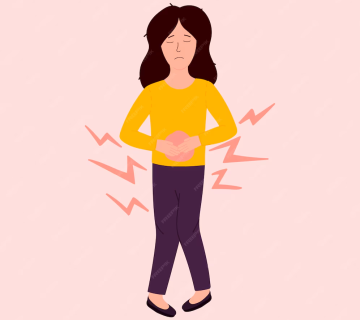
Can Herpes Cause Pelvic Inflammatory Disease?
Pelvic Inflammatory Disease (often called PID) is a condition that affects many people with female reproductive organs. It happens when harmful bacteria or viruses travel into the reproductive system, leading to inflammation and infection. At the same time, Herpes—especially genital herpes—continues to be one of the most common sexually transmitted infections (STIs) worldwide. But can herpes actually cause PID? This question might seem simple, yet the answer can be more complex than it first appears.
In this article, we’ll explore the connection between herpes and PID in a clear, easy-to-understand way. We will look at how herpes works, what PID involves, and whether the herpes simplex virus (HSV) can lead to pelvic inflammatory disease. We’ll also share real-life tips, the latest research, and important steps you can take to protect your reproductive health. By the end, you’ll have a much deeper understanding of both conditions and how they interact.
Understanding Herpes
Herpes is a common viral infection caused by two main types of the herpes simplex virus (HSV):
- HSV-1 (oral herpes): Most often causes cold sores around the mouth but can also cause genital infections.
- HSV-2 (genital herpes): Primarily affects the genital region but can sometimes infect the mouth.
How Herpes Spreads
Herpes spreads through direct contact with an infected area or through contact with body fluids from someone who has the virus. This can include:
- Skin-to-skin contact during oral, vaginal, or anal sex
- Kissing or sharing items like lip balm or drinks if blisters are present near the mouth
- Contact with genital sores or areas where the virus can be shed, even if no visible sores are present
Even if a person doesn’t show visible sores, they can still pass the virus to another person. This is known as “asymptomatic shedding.” It’s one of the reasons why herpes is so widespread.
Common Symptoms of Herpes
Some people with herpes never have noticeable symptoms, while others experience outbreaks. Typical symptoms include:
- Small, painful blisters around the mouth or genitals
- Itching or tingling in areas where blisters appear
- Flu-like signs (fever, swollen lymph nodes, body aches) in some cases
These symptoms can come and go in cycles, known as outbreaks. The first outbreak tends to be the worst, and future outbreaks are usually milder.
Emotional and Social Impact
Herpes often comes with emotional stress and social stigma. Many people worry about how others will react if they test positive. But it’s important to remember:
- Herpes is common—millions of people live with it.
- Proper treatment and self-care can manage outbreaks and reduce transmission risk.
- Open communication with partners and regular check-ups can help maintain a healthy sex life.
What Is Pelvic Inflammatory Disease (PID)?
Pelvic Inflammatory Disease is an infection and inflammation of the female reproductive organs, including the uterus, fallopian tubes, and ovaries. It can happen when sexually transmitted bacteria or viruses move upward from the vagina or cervix into the reproductive tract. In more severe cases, PID can lead to complications such as scarring of the fallopian tubes, infertility, or chronic pelvic pain.
Common Causes of PID
The main culprits behind PID are typically bacterial infections, especially:
- Chlamydia trachomatis
- Neisseria gonorrhoeae
Less commonly, other bacteria like Mycoplasma genitalium or BV-related bacteria (bacterial vaginosis) can play a role. However, the question remains: can viral infections, such as herpes, cause or contribute to PID?
Symptoms of PID
PID symptoms can vary from mild to severe, and some people may not notice any symptoms until later in the infection. Common signs include:
- Lower abdominal or pelvic pain
- Abnormal vaginal discharge (often yellow or green and with a foul odor)
- Pain during intercourse
- Fever or chills (if the infection becomes severe)
- Painful urination
Because PID can sometimes have mild or no symptoms, it’s crucial to stay on top of regular STI testing and pelvic exams if you are sexually active.
Complications of PID
When left untreated, PID can lead to serious problems, including:
- Chronic pelvic pain: Inflammation can damage tissues, causing long-term discomfort.
- Ectopic pregnancy: If scarring of the fallopian tubes occurs, it can make fertilized eggs implant in the tubes instead of the uterus.
- Infertility: Damage to the reproductive organs can make getting pregnant difficult or impossible.
Can Herpes Cause PID?
Now, let’s address the core question: Does herpes directly cause pelvic inflammatory disease?
What the Research Suggests
-
Bacterial vs. Viral Causes
Studies show that PID is most often caused by bacterial infections (like chlamydia and gonorrhea). Herpes, caused by a virus, is less commonly discussed as a direct trigger for PID. -
Secondary Infections
However, having a herpes infection can make the genital area more prone to open sores or lesions. These sores may compromise the local immune defense, creating an environment where bacteria can enter more easily. Some experts suggest that, in theory, if a person has ongoing inflammation or sores from herpes, they might be at higher risk for other infections that can lead to PID. -
Rare but Possible Interactions
While it’s not typical for herpes alone to cause PID, any changes in the vaginal environment might contribute to an increased likelihood of bacterial infection traveling upwards. A study published in the Journal of Infectious Diseases found that mixed infections (where someone has both a viral and bacterial STI) can sometimes lead to more severe outcomes. -
Immune Response Factors
Herpes outbreaks trigger an immune response that can alter the balance of bacteria in the genital tract. This imbalance might give harmful bacteria a better chance to grow. Although rare, this scenario can’t be completely dismissed.
Key Point: Herpes on its own is not the main cause of PID. However, in certain conditions, it may increase the risk of other infections that could lead to PID.
Why This Matters to You
Understanding that herpes is not usually the direct cause of PID should help you manage your fears and focus on the real risks. Still, being aware of how one STI can open the door to another type of infection is vital for anyone who is sexually active. It reminds us that practicing safe sex and getting regular check-ups can greatly reduce the risk of PID, even if you have herpes.
Overlapping Risk Factors and How They Interact
People often wonder how herpes and PID might intersect if they’re not directly linked most of the time. The answer lies in risk factors. These are habits, behaviors, or conditions that increase your chance of getting an STI and possibly developing PID.
Sexual Behavior
- Multiple sexual partners (✔️): Increases your exposure to different sexually transmitted infections, including both herpes and the bacteria that most often cause PID.
- Unprotected sex (❌): Lack of barrier protection (such as condoms) can allow viruses and bacteria to pass freely from partner to partner.
Immune System Health
- Weakened immunity (❌): Conditions like HIV, certain medications, or even stress can lower your body’s defenses. This makes it harder to fight off herpes outbreaks and other infections.
- Healthy lifestyle (✔️): Good nutrition, enough sleep, and regular exercise can support your immune system, making outbreaks less severe and lowering the chance of secondary infections.
Co-Infections
- Other STIs (❌): Having one STI can make you more vulnerable to another. For instance, genital sores caused by herpes can make it easier for bacteria like gonorrhea or chlamydia to enter your body.
- Treatment and follow-up (✔️): If you do test positive for any STI, follow your treatment plan carefully. Early treatment and follow-up tests can reduce complications and lower the risk of PID.
Symptoms Overlap to Watch Out For
Both herpes and PID can cause uncomfortable or painful symptoms. While they differ, there’s some overlap that can be confusing:
-
Pelvic pain:
- Herpes outbreaks can cause discomfort or pain in the genital region, but it’s usually focused where the sores appear.
- PID often causes deeper pain in the lower abdomen or pelvis, which might worsen during sex or physical activity.
-
Unusual discharge:
- Herpes itself doesn’t typically cause significant changes in vaginal discharge, though sores can weep fluid.
- PID commonly leads to a foul-smelling or yellow/green discharge.
-
Fever:
- Herpes can occasionally cause flu-like symptoms during the first outbreak, including fever.
- PID can produce fever and chills, especially if the infection is severe.
-
Painful urination:
- Herpes sores near the urethra can make peeing painful or cause a burning sensation.
- PID can also cause pain during urination, but it’s often due to the infection irritating the urinary tract.
Tip: If you have any of these symptoms and are unsure what they mean, it’s best to see a healthcare provider for a thorough exam and testing.
Treatment Options: Herpes and PID
Managing Herpes
There is no known cure for herpes, but treatments can help manage outbreaks and reduce virus transmission. Common treatment approaches include:
| Treatment | Purpose | Example Medication |
|---|---|---|
| Antiviral Drugs | Lessen outbreak severity and frequency | Acyclovir, Valacyclovir, Famciclovir |
| Topical Creams | Help soothe sores and reduce pain | Prescription or OTC ointments |
| Lifestyle Changes | Reduce triggers for outbreaks | Stress management, proper rest, healthy diet |
Practical Tips:
- ✔️ Start treatment early: Taking antiviral medication at the first sign of a breakout can shorten its duration.
- ✔️ Open communication: Tell sexual partners about your herpes status so you can reduce the risk of spreading the virus.
- ❌ Don’t share personal items: Avoid sharing towels or undergarments during an active outbreak.
Treating PID
Because bacteria are most often the root cause of PID, the main treatments revolve around antibiotics. However, if a virus or other organism is suspected, your doctor might tailor a broader treatment plan.
-
Antibiotics
- Oral or IV: Depending on the severity of the infection, you may take oral antibiotics or receive them through an IV in more severe cases.
- Completing the course: It’s critical to finish all prescribed antibiotics even if symptoms improve before you’re done.
-
Pain Management
- Over-the-counter pain relievers: Medications like ibuprofen or acetaminophen can help relieve pelvic pain.
- Rest and hydration: Staying hydrated and resting can support your body’s immune system and healing.
-
Hospitalization in Severe Cases
- If you have a severe infection or are pregnant, you might need hospital care. In very serious cases, surgical procedures could be required to drain abscesses.
Note: Even after successful treatment, some damage to the reproductive organs may remain. This is why early detection and treatment are so important.
Prevention Strategies for Herpes and PID
Even though herpes and PID differ in how they usually develop, the strategies to prevent STIs overlap significantly.
Safe Sex Practices
- Condoms (✔️): Using condoms or dental dams every time you have oral, vaginal, or anal sex drastically reduces the risk of spreading herpes and the bacteria that cause PID.
- Monogamy (✔️): Having one partner—or fewer partners—lowers your exposure to STIs.
- Regular STI Testing (✔️): Testing at least once a year (or more often, depending on your situation) can catch infections early, before they lead to complications like PID.
Vaccinations and Healthcare
- HPV Vaccine (✔️): While this doesn’t prevent herpes or PID directly, staying up-to-date with recommended vaccines protects overall reproductive health.
- Routine Check-Ups (✔️): Many STIs have few or no symptoms, so regular pelvic exams can identify potential issues early.
Lifestyle Factors
- Reduce Stress (✔️): High stress levels can trigger herpes outbreaks and weaken the immune system, making it harder to fight off infections.
- Avoid Douching (❌): Douching disrupts the natural balance of bacteria in the vagina, increasing the risk of infections that lead to PID.
Communication with Partners
- Discuss Health Status (✔️): Openly talk about your sexual health history and STI status with new partners.
- Get Tested Together (✔️): If possible, get tested for STIs as a couple before becoming sexually active.
Exploring the Latest Research
Researchers continue to study links between viral STIs (like herpes) and bacterial infections that cause PID. While evidence shows that herpes alone does not often lead to PID, ongoing studies aim to find out how the immune system changes during frequent herpes outbreaks and whether those changes might create a bigger window for bacterial infections.
-
Microbiome Research
- Scientists are examining how the “microbiome” of the vagina shifts when someone has frequent herpes outbreaks. This area of research is relatively new but could offer insights into preventing complications like PID.
-
Antiviral Therapy and PID Rates
- Some studies suggest that people on consistent antiviral therapy for herpes might have a reduced risk of secondary bacterial infections. This doesn’t prove a direct cause and effect, but it’s a promising area for future investigation.
-
Co-Infection Prevention Strategies
- Researchers are exploring new prevention programs that address multiple STIs at once. For instance, offering combination testing, counseling, and immediate treatment for common bacterial STIs and herpes in a single clinic visit.
Frequently Asked Questions (FAQs)
Can herpes make PID worse if I already have it?
Herpes sores can irritate the tissues in the genital area and sometimes make it easier for bacteria to grow. While having herpes doesn’t necessarily make PID “worse,” it may increase local inflammation and discomfort. Speak with a healthcare provider about a comprehensive treatment plan if you have both conditions.
How do I know if I have PID or a herpes outbreak?
- PID often causes lower abdominal pain, fever, and abnormal discharge.
- Herpes usually causes painful blisters or sores on the genitals or mouth.
If you notice any combination of these symptoms or are unsure, see a medical professional for an exam and STI testing.
Is there a vaccine for herpes?
Currently, there is no approved vaccine for herpes in humans. Researchers are working on developing one, but clinical trials are ongoing, and no widely available vaccine has been released yet.
Can men get PID?
Pelvic Inflammatory Disease specifically targets female reproductive organs. Men can get other types of infections in the reproductive tract (like epididymitis or urethritis), but these are usually not called PID. However, men can still carry the bacteria or virus that might lead to PID in a female partner.
Should I avoid sex if I have herpes?
During an active outbreak, it’s best to avoid sexual contact to prevent transmitting the virus. Even between outbreaks, using condoms or dental dams is important because asymptomatic shedding can still transmit herpes. Talk openly with your partner about the risks.
Real-Life Tips and Step-by-Step Guides
The goal of these checklists and guides is to empower you with practical actions for preventing both herpes complications and PID.
Checklist for People With Herpes
- ✔️ Take Antiviral Medication
- Follow your prescribed schedule for acyclovir, valacyclovir, or famciclovir.
- ✔️ Recognize Outbreak Triggers
- Common triggers: stress, fatigue, certain foods (like chocolate, nuts), and sunlight.
- ✔️ Practice Safe Sex
- Use condoms or dental dams, especially during the “shedding” period.
- ✔️ Keep the Area Clean
- Gently wash sores with mild soap and warm water.
- ✔️ Communicate with Partners
- Let them know you have herpes so you can make informed decisions together.
Steps to Prevent PID
- ✔️ Get Regular STI Screenings
- At least once a year or more frequently if you have new or multiple partners.
- ✔️ Use Protection Every Time
- Condom use is crucial in preventing many STIs.
- ✔️ Complete Antibiotics
- If you’re diagnosed with chlamydia, gonorrhea, or PID, take the full course of antibiotics even if you feel better.
- ✔️ Listen to Your Body
- If you notice pain, discharge changes, or fever, see a healthcare provider right away.
- ❌ Avoid Self-Diagnosis
- Don’t rely on internet searches or guesswork. Seek professional help for an accurate diagnosis.
Addressing Myths and Misinformation
Myth 1: “If I Have Herpes, I Will Definitely Get PID.”
Reality: Herpes itself is not a primary cause of PID. While having any STI can slightly raise your overall risk for other infections, it does not guarantee that you’ll develop PID.
Myth 2: “Herpes Only Affects People With Promiscuous Lifestyles.”
Reality: Herpes does not discriminate. It can spread through any sexual contact or even non-sexual contact (like kissing someone with an active oral sore). You can contract herpes from a single encounter if the partner is infected.
Myth 3: “If I Don’t Have Symptoms, I Can’t Spread Herpes or PID-Causing Bacteria.”
Reality: Asymptomatic shedding is common in herpes, and bacterial STIs like chlamydia can be present without symptoms. You can pass the infection to another person even if you feel perfectly healthy.
Talking with Your Healthcare Provider
What to Discuss
- Symptom History: Keep track of when you experience sores, unusual discharge, or pelvic pain.
- Sexual History: Be honest about your number of partners and protection methods.
- Concerns and Fears: It’s normal to feel worried about herpes or PID. Voice those concerns so your provider can address them.
- Future Family Plans: If you hope to become pregnant in the future, ask about fertility-impacting conditions like PID or recurrent herpes outbreaks.
Tests and Examinations
- Physical Exam: A pelvic exam helps assess for sores or signs of infection.
- Lab Tests: You might need blood tests, urine tests, or swabs from the cervix, vagina, or sores to identify the specific pathogen.
- Ultrasound or Other Imaging: If PID is suspected to be severe, an ultrasound can look for abscesses or damage to reproductive organs.
Additional Resources and Support
- CDC (Centers for Disease Control and Prevention): Offers comprehensive information on STIs, including herpes and PID.
- Local Clinics and Health Centers: Many provide free or low-cost STI testing and counseling.
- Support Groups: Online forums and local meetups can offer a sense of community and help with the emotional impact of herpes.
Bringing It All Together
- Herpes is a common viral STI that causes blisters and can sometimes make it easier for bacterial infections to set in.
- PID is a serious infection usually triggered by bacteria, such as chlamydia and gonorrhea, and can lead to infertility and chronic pain if untreated.
- Herpes alone rarely causes PID, but it may increase the risk indirectly by weakening local defenses or causing breaks in the skin.
- Prevention involves consistent condom use, regular STI testing, open communication with partners, and careful attention to any unusual symptoms.
- Treatment for herpes focuses on antiviral medications and managing outbreaks, while PID treatment typically involves antibiotics.
- Staying informed about the latest research helps you make better decisions about your sexual health and relationships.
Join the Conversation
Your health journey is personal, but sharing questions, stories, and tips can help build a supportive community. Have you or someone you know dealt with both herpes and PID? What strategies or resources helped the most? Feel free to share your experiences or ask any follow-up questions. By talking openly, we can all learn more about preventing and managing these conditions—and help others feel less alone.
We’d love to hear from you! Let us know your thoughts, experiences, or questions in the comments below. What has been most surprising or helpful in your journey toward better sexual and reproductive health?




No comment